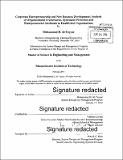| dc.contributor.advisor | Valentin Livada. | en_US |
| dc.contributor.author | Al-Tayyar, Mohammad H. (Mohammad Haytham) | en_US |
| dc.contributor.other | System Design and Management Program. | en_US |
| dc.date.accessioned | 2014-10-08T15:24:00Z | |
| dc.date.available | 2014-10-08T15:24:00Z | |
| dc.date.copyright | 2014 | en_US |
| dc.date.issued | 2014 | en_US |
| dc.identifier.uri | http://hdl.handle.net/1721.1/90706 | |
| dc.description | Thesis: S.M. in Engineering and Management, Massachusetts Institute of Technology, Engineering Systems Division, System Design and Management Program, 2014. | en_US |
| dc.description | Cataloged from PDF version of thesis. | en_US |
| dc.description | Includes bibliographical references (pages 113-122). | en_US |
| dc.description.abstract | Entrepreneurship is a distinctively individual concept. The individual entrepreneur works on his or her own to create a new business. Employees on the other hand function within the boundaries of the company. Employees that behave entrepreneurially collectively create the phenomenon of corporate entrepreneurship. In this thesis, we study the most common and overarching traits, characteristics and attributes of individual entrepreneurs. We analyze the most commonly prevalent traits and analyze how companies can be structured to foster strong sustainable corporate entrepreneurial ecosystems. The research also evaluates different corporate entrepreneurial models, types and frameworks through analyzing existing processes for creating corporate entrepreneurship and new business development. We explore concepts such as corporate venturing, corporate new business development, intrapreneurship, joint venturing, alliances, entrepreneurial human resource management, entrepreneurial organizational designs and business model innovation strategies. Specific companies that exemplified specific corporate entrepreneurship processes were analyzed such as DuPont 3M, IBM and Degussa AG. The concept of corporate entrepreneurship is instrumental in creating growth for companies but also could be a source of risk, where the example of Samsung Motors describes some of the negative impacts of corporate diversification. The research considers sustainable approaches for successfully implementing corporate entrepreneurship and new business develop and focus is given on the human interactions between the employee and the company. | en_US |
| dc.description.statementofresponsibility | by Mohammad H. Al-Tayyar. | en_US |
| dc.format.extent | 122 pages | en_US |
| dc.language.iso | eng | en_US |
| dc.publisher | Massachusetts Institute of Technology | en_US |
| dc.rights | M.I.T. theses are protected by copyright. They may be viewed from this source for any purpose, but reproduction or distribution in any format is prohibited without written permission. See provided URL for inquiries about permission. | en_US |
| dc.rights.uri | http://dspace.mit.edu/handle/1721.1/7582 | en_US |
| dc.subject | Engineering Systems Division. | en_US |
| dc.subject | System Design and Management Program. | en_US |
| dc.title | Corporate entrepreneurship and new business development : analysis of organizational frameworks, systematic processes and entrepreneurial attributes in established organizations | en_US |
| dc.title.alternative | Analysis of organizational frameworks, systematic processes and entrepreneurial attributes in established organizations | en_US |
| dc.type | Thesis | en_US |
| dc.description.degree | S.M. in Engineering and Management | en_US |
| dc.contributor.department | System Design and Management Program. | en_US |
| dc.contributor.department | Massachusetts Institute of Technology. Engineering Systems Division | |
| dc.identifier.oclc | 891066043 | en_US |
